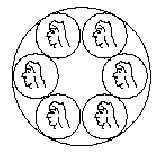| Time Limit: 1000MS | Memory Limit: 65536K | |
| Total Submissions: 6397 | Accepted: 3978 |
Description
Alice and Bob decide to play a funny game. At the beginning of the game they pick n(1 <= n <= 106) coins in a circle, as Figure 1 shows. A move consists in removing one or two adjacent coins, leaving all other coins untouched. At least one coin must be removed. Players alternate moves with Alice starting. The player that removes the last coin wins. (The last player to move wins. If you can‘t move, you lose.)

Figure 1
Note: For n > 3, we use c1, c2, ..., cn to denote the coins clockwise and if Alice remove c2, then c1 and c3 are NOT adjacent! (Because there is an empty place between c1 and c3.)
Suppose that both Alice and Bob do their best in the game.
You are to write a program to determine who will finally win the game.

Figure 1
Note: For n > 3, we use c1, c2, ..., cn to denote the coins clockwise and if Alice remove c2, then c1 and c3 are NOT adjacent! (Because there is an empty place between c1 and c3.)
Suppose that both Alice and Bob do their best in the game.
You are to write a program to determine who will finally win the game.
Input
There are several test cases. Each test case has only one line, which contains a positive integer n (1 <= n <= 106). There are no blank lines between cases. A line with a single 0 terminates the input.
Output
For each test case, if Alice win the game,output "Alice", otherwise output "Bob".
Sample Input
1 2 3 0
Sample Output
Alice Alice Bob
Source
POJ Contest,Author:Mathematica@ZSU
比自己想象中的easy 1e9倍啊233
感觉这东西没法求SG,那么一定是个玄学题
事实证明自己还是太菜了
结论:当n==2或n==1是先手胜,否则后手胜
证明:
当$n$为偶数时,不论先手怎么走,后手总会根据中心对称模仿先手走
当$n$为奇数时,不论先手怎么走,后手总会进行与之相反的操作来构造成第一种情况
#include<cstdio> int main() { int T_T; while( scanf("%d",&T_T) && T_T ) T_T>2?printf("Bob\n"):printf("Alice\n"); return 0; }
